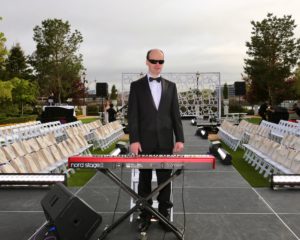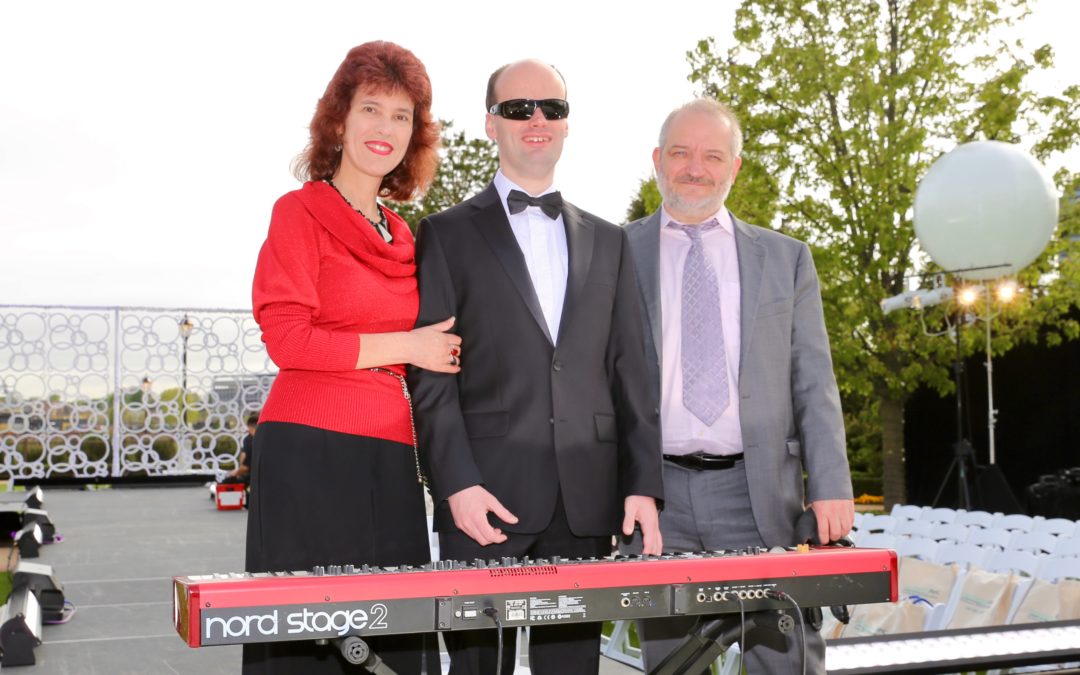Santon is an award-winning musician who is blind from birth and has autism. He was born in 1991 in St. Petersburg, Russia, and at the age of 1.5 years moved with his family to Massachusetts. He has Savant Syndrome, a rare condition in which people with various developmental disorders, including autism disorder, have an amazing ability and talent. Over the years, Santon has performed with Peter Wolf, Bob Weir of the Grateful Dead and Natalie Merchant. He plays regularly with the Boston Tango Orchestra. Santon has also regularly performed at Northeast Arc events, including An Evening of Changing Lives Under the Stars. Santon, and his mother Julia, recently spoke to Gloria Ricardi Castillo, director of family support centers at Northeast Arc. Read their conversation below.
Gloria: Santon, how old were you when you moved to the United States and where did you receive the diagnosis of autism?
Santon: I moved to the US when I was 1.5 years old I was diagnosed with ASD at Boston Children’s Hospital when I was a teenager.
Gloria: Julia, why was the reason for moving the family to the United States?
Julia: Originally, we had no intention to leave our country, since even before our wedding my future mother-in-law made us promised her never to leave Russia. Santon was only 3 months old when he was diagnosed with Septo-Optic Dysplasia (SOD). At the time doctors could not tell whether he had a developmental or intellectual disability. The only thing we knew was that he was blind without light perception. We were overly concerned, and quickly we started to do research on what to expect for Santon’s future if we stayed in St. Petersburg. We decide it that we needed to move to the US for Santon’s sake. Sadly, that also meant to break the promise we had made to my mother-in-law to never leave Russia. Fortunately, she understood and gave us her blessings, since this was all about giving her grandson the opportunity of a better-quality of life.
Gloria: Santon, when did you move to the US, and how old were you when you started to received services here?
Santon: We moved to the US in November 1992, 30 years ago. I was 1.5 years old when I started at the Perkins Infant-toddler program about a month or two after we arrived in this country.
Julia: That’s right. I remember taking Santon in his heavy Russian stroller to Perkins Infant-Toddler program twice a week by public transportation from Malden to Watertown. Looking back, it feels almost heroic. Back then, it was nothing extraordinary; we were used to traveling with our toddler from one end of St. Petersburg to another by public transportation. Back then in Russia, we had no school buses. Can you imagine my astonishment, when after Santon was formally accepted to the Perkins Preschool, the school bus would take Santon from home to Perkins and back every day?
Gloria: How did Santon communicate his wants and needs at that time?
Julia: Even at that age he articulated a lot of words and phrases in at least 2 languages, but until the age of 7 he was unable to verbally express himself. He had echolalia; he memorized and repeated the exact text he heard from others. After 20 years of speech therapy, he learned to use the memorized scripts more appropriately, but echolalia is still affecting Santon’s ability to speak, especially when discussing new topics. Music for Santon is the language he is fluent in. He memorized thousands of songs and classical compositions.
Gloria: Can you tell me some of the difficulties Santon/you and your husband experience because of his autism diagnosis then?

Santon on stage at Northeast Arc’s Evening of Changing Lives Under the Stars.
Julia: I remember how much he hated transitions from one activity to another and he hated to go outdoors. He loves the outdoors, but transition was always painful when he was young. My husband and I love the outdoors and traveling. At the time we did not have money to travel much, but we had friends with typical children about Santon’s age who loved camping, boating, bicycling, etc. So, despite all the difficulties of getting Santon on the trips, we did travel across New England and upstate New York with our friends, tents, and backpacks. Our friends’ children did not know how to play with Santon, but he learned to enjoy listening to them playing games and shouting.
Gloria: When do you noticed that Santon had special abilities?
Julia: At a noticeably early age, Santon could tell the time precisely to a minute. That was even before he learned to use a Braille watch or got his first talking watch. He learned every single country in the world and its capital city, he knew the capital of every US State, and every President of the United States with his sequential number of presidencies.
Gloria: You had mentioned that he started taking piano lessons at 3.5 years of age, when did you realized or noticed that he had a talent for music or interest for it?
Julia: We noticed that Santon was interested in music when he was only 1 year old. He played rhythms on clothing fasteners, velcro, zippers, utensils, furniture, and anything that makes noise. Once he got his first musical toys (at 1.5 years old) soon after we arrived in the US, he started playing simple tunes. But even if he did not show any obvious interest in music, we would still try to teach him to play the piano. My husband and I strongly believed that any human needs art in his life. The only truly accessible art for someone who was blind from birth was music. While pregnant with Santon, I used to go to the St. Petersburg’s Philharmonics. When he was a newborn and even before we knew he was blind, we played vinyl’s with waltzes by Chopin while I was breastfeeding him. Twenty-five years later, he recorded his own album playing these waltzes on the piano.
Gloria: Santon, do you have a favorite genre of music?
Santon: I like them all, but my favorite genre is tango.
Gloria: Tell me more about your awards and the music you have composed?
Santon: The first award I won was the Joyce Walsh Junior Disability award for performing a classical selection: second place in 2007 and first place in 2008, when I was 16 years old. As a first prize winner, I was invited to perform at the National Federation of Music Clubs Convention 2008 in Denver, Colorado. In 2016, I released two albums: “Flavors of the Rainbow” and “Night Animals”. The Flavors of the Rainbow consists of the classical selection from Bach to Debussy that I played on the piano. In the “Night Animals” album my music partner CD Collins and I recorded an album in spoken word & music genre, where I accompanied her short stories with my own musical arrangements. As there were not many live performances going on in 2020, I have used my time at home to compose more music and build my YouTube fanbase. At that time, I have written tunes such as “Destroy the Virus”, “I Miss You Friends” and “2020 Blues”. In this same year, my old friend Labrador retriever Parkie passed away, and in her memory, I wrote “Parkie’s Waltz”.
